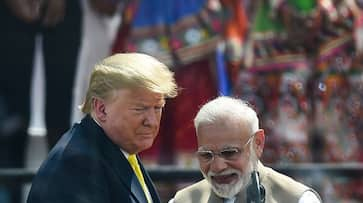India and USA together can defeat Beijing’s declared plans to become the world leader in artificial intelligence (AI)
When I was a student in Zurich, Switzerland, I learnt something. I learnt that our personal data is precious, and it cannot be sold or used by anybody just like that. Data empowers those who have it. So, if we just randomly give sensitive information to corporates or governments, we are giving them a free hand to control us. In Switzerland, people are incredibly concerned about their privacy, and so are the regulators and the government. My experience there taught me that privacy is paramount as it helps to keep the power with the people. Isn’t this a fundamental requirement for a democracy?
Also read: Corporate Tax Cuts won’t work: It is time to make income up to Rs 12 lakh per annum tax free
On the other hand, the number of facial recognition companies in China are growing at an alarming rate, thanks to the massive domestic market and an authoritarian regime with little to no concern for privacy and human rights. Lest we forget that infamous episode of BBC reporter John Sudworth, who was tracked down in just seven minutes using CCTV networks coupled with Artificial Intelligence. Oh, we should not only think that this is restricted to just the government! Even private organizations use such sensitive data to monitor workers in the organization. The citizens of China are virtually powerless when it comes to owning their own private data.
There are many technologies whose advent had a significant impact on the society, but none were more transformative than Artificial Intelligence or AI, which has the potential to replace humans! It is said to have deep-rooted impacts in a country’s military and economic powers which has the potential to change how societies should be ruled or governed.
Experts have predicted that Artificial Intelligence can increase economic productivity massively and has the potential to double up economic growth rates. So, it is incredibly lucrative for every country to gain an edge over the others in terms of Artificial Intelligence. Artificial Intelligence can change the way battles are fought by integrating a far better understanding of battlefields with synthesized information, faster decision-making systems and complex operations. The recent introductions of drone swarms are proof of the same. These are small autonomous drones which have the power and potential to disorient and overwhelm even the most powerful armies. So, the entire debate on who will lead the world – The United States of America or China- fundamentally rests on who will lead the whole Artificial Intelligence movement. This also brings another debate into the forefront; which form of governance is better suited for such a discourse: A democratic government or an authoritarian government.
But, let us take a look at how China is using Artificial Intelligence to torment its citizens. They have a scheme called Social Credit System which rewards or penalizes its citizens for their behaviour or their political loyalty. Now, China is using Artificial Intelligence to reduce the cost of and increase state surveillance to increase government control over public behaviour further. They are also using artificial intelligence to enable Deep Fakes and other forms of disinformation to exploit further and disrupt democracies.
The authoritarian nature of China has made it easy for the government to create policies that will lead to huge investments and corporate cooperation. It is estimated that the Chinese investment in artificial intelligence runs into double digit billion dollars. Companies like Baidu Inc., Alibaba etc. also support this endeavour. However, in contrast to this, no other country has been able to secure any support from corporates to cooperate with them to explore artificial intelligence options in national security applications. And there is a reason for this. China is a reservoir of vast amounts of private data of its citizens. This makes it easier for algorithms to drive present and future waves of innovation. However, these algorithm regimes ae extremely unethical and violate all international legal and privacy norms.
However, not all is lost for us. China’s madness to drive this artificial intelligence innovation is indicative of its deep-seeded insecurities. The investment in China’s artificial intelligence start-ups shrank from 124.3 billion yuan in 2018 to 84.1 billion yuan in 2019. Open political systems have many advantages, and that is what the corporates are realising slowly and steadily. India, for example, has been repeatedly billed as the hottest destination for start-ups with the recent renewed interest of the VCs.
We have seen Google, Oracle, Microsoft and Amazon battling to serve the cloud computing and machine learning needs of the American government, we can only expect similar drives to take place in India is the next three to five years. The Indian government has been pushing vehemently for digitisation which will now act as an incentive for the corporates to win big contracts, thus generating adequate funds for this revolution. Perhaps, a considerable number of start-ups in artificial intelligence who are doing ground-breaking work is proof enough that India is indeed not far behind in this race.
With the recent visit of Donald Trump in India, we can only expect it to lead this change. With the technical prowess of America and the talent pool of India, we can definitely wipe out Chinese supremacy from the globe. Together we can meander towards becoming future ready through concrete measures and an unwavering partnership. China’s artificial intelligence industry is expected to see its first-ever downturn in both deal numbers and total venture capital and private equity investment in China AI since 2012 this year. So, both India and USA should work together as a force to reckon with and capitalize on this opportunity to lead the Artificial Intelligence Innovation movement.
About Abhinav Khare
Abhinav Khare is the CEO of Asianet News Network and also the host of a daily show named Deep Dive with AK. He has a lifetime collection of books and gadgets and has already pinged more than hundred cities around the globe.
He is a tech entrepreneur, who is passionate about policy, technology, economy and philosophy from ancient India. He earned an MS Engineering from the ETH Zurich and an MBA Finance from the London Business School.
Last Updated Feb 25, 2020, 10:56 AM IST









![Salman Khan sets stage on fire for Anant Ambani, Radhika Merchant pre-wedding festivities [WATCH] ATG](https://static-gi.asianetnews.com/images/01hr1hh8y86gvb4kbqgnyhc0w0/whatsapp-image-2024-03-03-at-12-24-37-pm_100x60xt.jpg)
![Pregnant Deepika Padukone dances with Ranveer Singh at Anant Ambani, Radhika Merchant pre-wedding bash [WATCH] ATG](https://static-gi.asianetnews.com/images/01hr1ffyd3nzqzgm6ba0k87vr8/whatsapp-image-2024-03-03-at-11-45-35-am_100x60xt.jpg)


